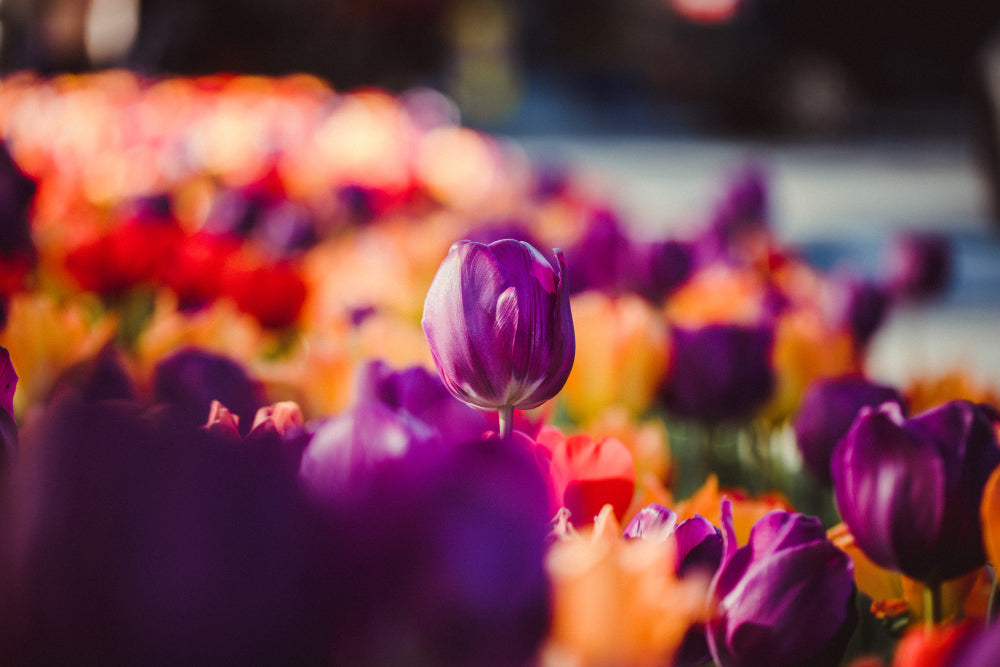Do you dream of a beautiful garden full of blooming flowers and lush greenery? Gardening is a wonderful hobby that allows us to enjoy nature and create beautiful spaces. If you want to start a garden but don't know where to start, this guide is for you! Discover the secrets of planting bulb flowers, learn how to care for plants and how to create a beautiful garden that will delight all season long.
Why is it worth planting flower bulbs?
 Planting flower bulbs is a great way to add color and life to your garden. Bulb flowers, such as tulips, narcissus, hyacinths and crocuses, bloom in spring and add charm and joy after a long winter. They are not only beautiful, but also easy to grow. Bulbs can be planted in autumn and then enjoy their beautiful flowers in spring. Bulb flowers are also perfect for planting in pots or containers, so you can have beautiful flowers even on your balcony or terrace.
Planting flower bulbs is a great way to add color and life to your garden. Bulb flowers, such as tulips, narcissus, hyacinths and crocuses, bloom in spring and add charm and joy after a long winter. They are not only beautiful, but also easy to grow. Bulbs can be planted in autumn and then enjoy their beautiful flowers in spring. Bulb flowers are also perfect for planting in pots or containers, so you can have beautiful flowers even on your balcony or terrace.
When and how to plant flower bulbs?
Planting bulb flowers usually takes place in autumn, before the arrival of frost. This is important because bulbs need a resting period and cool temperatures to develop and bloom in spring. The best time to plant flower bulbs is usually October or November. Before planting, make sure you choose healthy bulbs that are firm and free from damage.
Step 1: Choosing the right plants
Before you start planting flower bulbs, think about what plants you want in your garden. Choose the species that best suit your climate and aesthetic preferences. Tulips, narcissus, hyacinths, crocuses - these are just a few examples of popular bulb flowers. You can also choose mixtures that contain different species and varieties, creating beautiful and diverse compositions.
Step 2: Soil preparation
Before planting flower bulbs, it is important to prepare the soil. Make sure the soil is well watered and drained. If the soil is too hard or too clayey, you may want to add compost or sand to improve its structure and drainage. Dig the soil to a depth of about 20-25 cm, removing stones and weeds. Also add organic fertilizer, which will provide the plants with the necessary nutrients.
Step 3: Planting bulbs
Now it's time to plant the bulbs. Dig holes of appropriate depth and spacing, depending on the requirements of individual plants. Typically, the depth of the hole should be about 2-3 times the height of the bulb. Place the onion in the hole, making sure the pointed side is facing up. Then cover the bulb with soil and tamp it down lightly to ensure good contact with the soil.
Step 4: Plant care and protection
After planting flower bulbs, it is important to provide them with proper care. Water your plants regularly, especially during dry periods. You can also apply a layer of mulch around the plants to retain moisture and reduce weed growth. In the case of plants that are sensitive to frost, such as some varieties of tulips, it is worth covering them with agrotextile or straw to protect them against severe frosts.
The art of a beautiful garden
 Planting flower bulbs is just the beginning. To create a beautiful garden, it is worth paying attention to several important aspects.
Planting flower bulbs is just the beginning. To create a beautiful garden, it is worth paying attention to several important aspects.
- Choosing the right plants and compositions - When planning your garden, choose plants that suit your climate, soil and light conditions. Vary the height, shape and color of flowers to create interesting compositions. You can also include plants with different blooming seasons to ensure you have beautiful flowers all season long.
- Appropriate gardening tools - To keep your garden in good condition, it is worth purchasing the right gardening tools . Gloves , pruners , shovels, plant care tools - these are just a few examples of necessary accessories. Thanks to them, you will be able to carry out garden work effectively and take care of your plants.
- Systematic care - Garden care is not only about planting plants. Regular watering, fertilizing, removing weeds and pruning plants are tasks that should be performed regularly. Thanks to systematic care, you will keep your garden in good condition and provide your plants with the best conditions for growth and flowering.
- Create your own compositions - Be creative and create your own plant compositions. You can experiment with different colors, textures and heights to create unique and beautiful arrangements. You can also include decorative elements such as stones, sculptures or fountains to give your garden additional charm.
A delightful garden at any time of the year
Planting bulb flowers and creating a beautiful garden is a great challenge that allows us to enjoy the beauty of nature. Remember to choose the right plants, care and creativity. Create your own compositions and enjoy the beauty of your garden all season long. Don't forget to also stock up on the necessary tools that will help you keep your garden beautiful and thriving.

